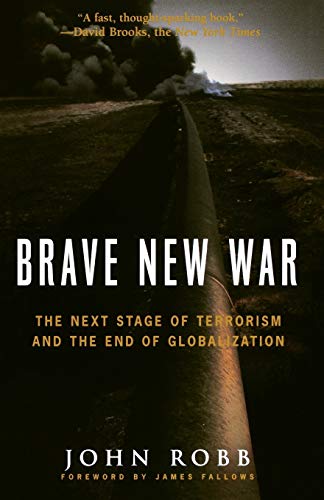Washington Examiner
May 22, 2007

REVIEW: John Robb, Brave New War: The Next Stage of Terrorism and the End of Globalization (New York: Wiley, 2007).
John Robb has spent his career studying terrorism, computer systems, and risk management. He has brought these experiences to bear in this vital study of global terrorism. The view is bleak.
The terrorists are not only winning, they are unstoppable. We’re wasting trillions on defense and homeland security in a futile attempt to fight an enemy we don’t understand.
What most think of as the discrete problems of terrorism, insurgency, drug smuggling, and organized crime are actually multiple faces of the same global guerrilla movement. An ever-growing number of super-empowered groups have taken advantage of modern technologies and evolved into highly sophisticated, organic forces of systemic disruption.
They have no desire to overthrow governments to assume political power; they are content merely to create havoc so they can “take control of their own economic and social destiny” at the tribal level.
This has already happened. Large parts of Iraq, Pakistan, Colombia, Nigeria, Thailand, and other countries are now outside the control of the central government. Nor are great powers immune. Chechen guerrillas have thwarted Moscow for years.
Despite our enormous resources, the United States could, like the Soviet Union, be “driven to bankruptcy by a foe it couldn’t compete with economically.” We were able to outspend the Soviets. Now, we’re fighting an enemy that can spend a few thousand dollars to create billions of dollars’ worth of destruction. This creates a vast asymmetry of vulnerabilities, as the enemy has no infrastructure we can target.
Robb notes that we need only to watch what’s happening in Iraq to see this in action on a smaller scale. Our superb modern military coalition quickly defeated Saddam’s army and toppled his government, with few friendly casualties and a minimum of collateral damage. Things quickly spun out of control, though, once a constantly evolving coalition of guerrillas started its campaign of systems disruption.
The problem is not that Coalition forces failed to apply counterinsurgency theory properly, but that we’re not fighting a classic insurgency. Holding rapid elections to give the citizenry a stake in the society should have helped dry up support for the guerrillas. But that’s because insurgents usually need to maintain popular support to build toward the day when they eventually take control of the state.
The dozens of distinct and uncoordinated groups we’re fighting, however, are not faced with those constraints. They merely need to ensure that the existing government cannot deliver on essential services.
By strategically targeting the electric grids, oil pipelines, police stations and other key “systempunkts,” they can create economic havoc and, more importantly, cause governments to overreact by stripping citizens of freedom in the name of security and wasting billions to defend against threats that will simply move on to softer targets.
Further, the perpetrators of “open-source warfare” are virtually immune from fatal attack. Killing and capturing leaders has little impact since there is little central planning. Those staging major attacks in Baghdad, London and Madrid do so without the advance knowledge of, let alone support from, al Qaeda’s command structure.
In Iraq, at least seven distinct groups of guerrillas — most of whom hate one another and may well fight each other once we leave — have managed to run a seamless campaign despite near-total lack of coordination.
The attacks happen organically, much like an article on Wikipedia or the development of add-ons to popular open-source software packages. Success by one guerrilla group will spawn imitators, and failures will be avoided by others.
While we spend billions and imposehardships on our own people to prevent a recurrence of the last attack, the real danger comes from “black swans” that are “so different from what we know, so unpredictable and hidden by uncertainty, that they are impossible to predict with accuracy.”
After laying out such a horrible scenario, the custom is for the author to lay out a simple solution for fixing the problem that could have been done years ago if only the people in power were not so incompetent. Robb offers no such magic bullet.
Instead, he explains that we must simply “learn to live with the threat they present” and adopt a “philosophy of resilience that ensures that when these events do occur (and they will), we can more easily survive their impact.”